In Japanese, dame ダメ, also spelled dame 駄目, dame だめ, means a bunch of bad things. It can mean something is "bad," that it's "no good," "inadequate," "poor," "unfit;" that it's become "ruined," "spoiled;" that doing it is bad, that you shouldn't, "no;" that someone is bad at something, that their skills "suck;" that someone is a "failure," they're "useless;" and so on.
"No Good"
Let's start with the literal meaning of dame ダメ. It means "no good," in the sense of being inadequate, unfit, of not satisfying a given requirement or purpose, of not being good enough, of being poor in quality, of being undesirable.
これはダメだ
Basically, imagine you're teaching a bunch of kids how to make pizza. You ask them to bring to you whatever ingredients they want to put on the pizza. One particularly troubled youth brings you a pineapple for topping. You say:
- kore wa dame da.
これはダメだ。
This is no good.- I'm not putting a pineapple onto a pizza. What are you? Insane?!
"Undoable"
Similarly, say that instead of making pizza like they were supposed to, the kids start a double-elimination proxy-battle tournament using summoned poké-mamono-mon-beasts wherein the winner gets to eat all the pizza, and also become the ruler of the demon world. Looking at the mess they're making, you say:
- kore wa dame da.
これはダメだ。
This is no good.- Look at the mess they're making.
- They're never making pizza like this.
- Stop.
- Y'all.
- STAHP!!!
"Doesn't Work"
The word dame ダメ can also mean something is "no good" in the sense it "doesn't work."
For example, let's say there's a door locked and you tried every way possible to open it. Exhausted, you throw a bomb at the door. It explodes, but the door is still there unopened. You mutter:
- kore mo dame ka?
これもダメか?
This, too, is no good?- Not even this works?
- kono houhou mo dame ka?
この方法もダメか?
This method, too, is no good?- This way doesn't work either?
"No Success"
This meaning of dame ダメ can more broadly be interpreted as being unsuccessful. For example, say you're searching around for a certain product, like a legendary Initial D doujinshi, but every store you go doesn't have it. You say:
- chi', kono mise mo dame ka
チッ、この店もダメか
Tsk, this store too is no good?- No success in this store too?
- This store doesn't have it either?!
- chi' チッ
*clicks tongue* (onomatopoeia.)
- koko mo dame ka
ここもダメか
Here too is no good?- They don't have it here either?!
Frustrated, you get your friend to help you search for it. After a while you meet again. You were unsuccessful in your quest, telling them:
- kocchi wa dame datta, socchi wa?
こっちはダメだった、そっちは?
My side was no good, yours?- I failed, what about you?
- I wasn't able to find it, were you?
I "Cant Handle" That
Just like dame ダメ can be used to say something is undoable, that it won't work, that it can't be done, the word can also mean something is unmanageable, that you can't handle it, that you are no good with it. For example:
- watashi wa hebi ga dame desu
私はヘビがダメです
About me: snakes are no good.- Other people can handle snakes, but I can't.
- muri muri muri
ムリムリムリ
Impossible, impossible, impossible. - Can't deal with them. They're scary. What if they bite me or something?!
- Also they're like huge worms. And worms are gross. So snakes are huge gross.
- watashi wa gyunyuu ga dame desu
私は牛乳がダメです
About me: cow milk is no good.- I don't like the stuff.
- It's bad for me.
- I'm lactose intolerant.
- It goes against my veganism to drink something produced from animals.
- I prefer coffee—love it—it's totally the opposite; they're like black and white to me.
- Point is: I'm not drinking milk.
In this sense, and in some other senses, too, dame ダメ is synonymous with NG.
- Context: Saiki Kusuo 斉木楠雄 can't handle two things, cockroaches and Nendou, who appear before him one after the other.
- {{koudou ga yomenai} mushi no} tsugi wa {koudou ga yomenai} Nendou made...
行動が読めない虫の次は行動が読めない燃堂まで・・・
After {a bug [whose] {actions [I] can't read}} is Nendou [whose] {actions [I] can't read}... - jii kimoi
G(ジー)◎キモイ
G. Gross.- G commonly stands for:
- gokiburi
ゴキブリ
Cockroach.
- enu kimoi
N(エヌ)◎キモイ
N. Gross.- N is for Nendou.
- kanben shite kure, boku wa enu mo jii mo enu-jii nanda
勘弁してくれ僕はNもGもNGなんだ
[Give me a break], for me N and G are no good.- I can't handle neither Nendou nor cockroaches.
My Skills "Suck"
From this "can't handle" meaning, the word dame ダメ can also mean you "suck" at something in the sense you're unskilled. You can't handle such task. Your ability is inadequate, no good. For example:
- watashi wa suugaku ga dame desu
私は数学がダメです
About me: math is no good. :(- Other people may be good at math, but I suck at it.
- My math is poor.
Gone "Bad"
Sometimes, dame ダメ is used to mean something has gone "bad" rather than being not good. That is, it's become inadequate for what was its original purpose. It's quality has decayed. It's now deficient.
- kou-kyouiku ga dame ni natta
公教育がダメになった
Public education has become bad.- It has become deficient.
- The quality of public education has decayed.
- The public education we have now isn't adequate, it's not good enough for what we need.
For a more generic word for "bad," see warui 悪い.
"Spoiled" Food
One case is when you're talking about food. Food is meant to be eaten. So when food becomes dame it can't be eaten anymore. It has become spoiled.
- keeki ga dame ni natta
ケーキはダメになった
This cake has become bad.- This cake has spoiled. :'(
- dame ni naru
ダメになる
To become "dame."
To become bad.
- kono keeki wa mou dame da
このケーキはもうダメだ
This cake is now bad.- This cake looks like it's spoiled now.
Note that the verb "to rot" in Japanese is kusaru 腐る, so "to be rotten" is kusatteiru 腐っている. This is written with the same kanji as "rotten girl," fujoshi 腐女子. If efforts are spoiled instead, it's dainashi 台無し.
"Unusable"
Sometimes, dame ダメ can mean "unusable," mostly in the sense of "I can't use this anymore." Like something happened which made that tool you had inadequate for what you used it for.
For example, let's say there's a gang of criminals trying to hide. They learn there's a traitor among their nakama who leaked the location of the hideout they were using, rendering it useless. The leader says:
- koko wa mou dame da, idou suru zo!
ここはもうダメだ、移動するぞ!
Here is now unusable, [we'll] move!- We can't hide here anymore, let's move [to another hideout]!
"Broken"
Sometimes, this "unusable" meaning of dame refers to something getting "broken." For example:
- jiko de kuruma ga dame ni natta node,
atarashii kuruma wo kuonyuu shimashita.
事故で車がダメになったので、
新しい車を購入しました。
Because in an accident the car became unusable,
[I] purchased a new car.
Doing It is Dame!
The word dame is sometimes used to describe an action as "no good." This can manifest in various ways.
The word yokunai よくない, "not good," is sometimes used similarly.
You Shouldn't Do That
If doing something is dame, that might mean you shouldn't do it. The reasons for this varies, but you really shouldn't do it.
- onna wo naguru no wa dame desho?
女を殴るのは駄目でしょ?
To hit women is no good, don't you agree?- You aren't supposed to hit women, right?
- You shouldn't, right? Right???
- ima keeki wo taberu no wa dame desu
今ケーキを食べるのは駄目です
Now to eat the cake is not good.- You shouldn't eat the cake now.
- Maybe because we're supposed to eat it later.
- Or because it's already too late and the cake has spoiled.
- gakkou wo saboru no wa dame darou
学校をサボるのは駄目だろう
To skip school is no good.- You should go to school.
- Don't stay shut in your room all day.
- Stop being a hikikomori.
The ~te-wa ~ては pattern, abbreviated ~cha ~ちゃ, is often used like this:
- sonna koto shicha dame yo
そんなことしちゃダメよ
Doing that is no good!- sonna koto shite wa naranai/ikenai/dame
こんなことしては(ならない/いけない/だめ)
- sonna koto shite wa naranai/ikenai/dame
It can also be used in the sense of telling people to refrain from doing something. Like:
- sono kangae-kata wa dame da
その考え方はダメだ
That way-of-thinking is no good.- Let's be positive!
Dame Means "No!"
From the usage above, we have the word dame meaning "no." It means "no" only when we're forbidding someone from doing something, when we're denying them, because what they're about to do is "no good," is dame.
The word that means "no" literally in Japanese would be iie いいえ.
To understand how it works, let's see an example of a conversation:
- sore nani?
それ何?
That's what?- What's that?
- choko keeki
チョコケーキ
[It's] a chocolate cake. - tabete ii?
食べていい?
Eating is good?- Eating is alright?
- Is it okay for me to eat it?
- Can I eat it?
- dame
ダメ
[That's] no good.- No.
- doushite dame?!
どうしてダメ?!
Why is it no good?!- Why not?!
As you can see, it feels weird to have dame ダメ up there alone. To understand it better, let's see it in a complete phrase:
- kono choko keeki wo taberu no wa dame desu
このチョコケーキを食べるのはダメです
The act of eating this chocolate cake is no good.- You shouldn't eat this chocolate cake.
Of course, nobody will ever say some long, weird phrase like that. What normally happens is that the context allows us to infer that dame alone means that the action is dame, that it's "no good" to do it, so you shouldn't do it, the answer is "no." Don't.
- koko ni sundemo ii desu ka?
ここに住んでもいいですか?
Can [I] live here? - un
うん
Hmm. - zettai dame
絶対ダメ
Absolutely not. - maji ka koitsu
マジかこいつ
Is this guy for real?
The word dame ダメ can be used in this sense even if nobody is explicitly asking for permission. For example:
Is That "Not Okay"?
Sometimes dame ダメ isn't used as an answer but as a question. That is, you're asking if something is dame, if doing something is no good. You're seeking approval, or rather, lack of disapproval from someone. For example:
- yooshi
よーし
Aaalright. - ima kara choito hou ni fureru koto suru kedo
今からちょいと法に触れる事するけど
[Starting] now, I'll do something that violates the law a bit,but.- choito
ちょいと - chotto
ちょっと
A bit. A little. - hou ni fureru
法に触れる
To touch the law. To collide with the law. To violate the law. - fureru
触れる
To touch. (as a matter of fact: ended up touching, brushing against.)- sawaru
触る
To touch. (intentionally: he touched the cat, petting it.)
- sawaru
- choito
- omae φ mite-minu furi shiro
おまえφ見て見ぬふりしろ
You, pretend not to see [anything].- mite
見て
To see, and... - minu furi
見ぬふり
Pretend not to see.
- mite
- yoisho~~
よいしょ~~
[Heave-ho!]- Expression of effort, he used it when climbing.
- he!?
へ!?
[What]!? - ...sore tte hanzaisha ni nare tte koto?
・・・それって犯罪者になれってこと?
...is that: "become a criminal," is what you're saying?- You're telling me to cooperate in a crime!
- dame ka?
ダメか?
Is [that] no good?- Is that not okay?
- Will you not help me?
- pan
パン
*clap*
Dame Da!
Often used as a reaction, the expression dame da ダメだ means, literally, that something is dame. That is, it's when something is "no good." It's used when stuff doesn't work. Etc.
- dame da kore!
ダメだこれ
It won't work, this [thing]! - dame datta
ダメだった
[It] didn't work. - dame ka?
ダメか?
It won't work after all? - dame da!
ダメだ!
Nothing works! - dame da!
ダメだ!
It's over! - dame da!
ダメだ!
It's useless!
Mou Dame Da!
The phrase mou dame もうダメ, or mou dame da もうダメだ, is dame ダメ together with the adverb mou もう. This adverb means something is somehow "now." Which translates to "already" a lot of times.
In the case of mou dame da, it often means it's "already no good." That it's "already hopeless." This is often used when someone is at their limit and can't hold it any longer.
- oishi-sou... mou dame da!
美味しそう… もうダメだ!
It looks so tasty... I can't take it anymore! - oishi-sou... mou genkai da!
美味しそう… もう限界だ!
It looks so tasty... I'm at my limit! - oishi-sou... mou gaman dekinai!
美味しそう…もう我慢できない!
It looks so tasty... I can't wait anymore!
Sometimes, in anime, the phrase mou dame is used as a suggestive joke, since it can mean "I can't hold it anymore" in the sense of being stimulated more than one can handle.
- mou dame' yamete!!
もうだめっやめて!!
I can't hold it anymore, stop!!- Context: Shinomiya Kaguya 四宮かぐや found something funny and can't stop laughing at it.
Dame-na People
Just like food can go bad, people can go bad too, so dame can be used to refer to people who are "no good." People whose quality is inferior. Useless people. Failures.
- Context: Hanabatake Yoshiko 花畑よしこ despite getting zero on every school test, confesses she doesn't study, all she does is eating, sleeping, and playing. The younger children she was playing with, hearing that, exclaim in unison:
- dame na otona da!
ダメな大人だ!
An useless adult!
Note that, in English, we use the phrase "spoiled child" to refer to a child who's "no good" in a certain sense. That doesn't translate to dame in Japanese. See:
- dame na ko
ダメな子
Child [who] is no good.
No-good child.
Useless child. A failure of a child.- A child who doesn't study, for example.
- The word ko 子 can also refer to adults, animals, machines.
- amaenbou
甘えん坊
Spoiled child.- In the sense they've been spoiled by their parents.
- amayakasu
甘やかす
To pamper. To spoil. (a child.) - amai
甘い
Sweet. (candy.)
Naive. (having inexperience.)
When dame refers to people in Japanese, it's normally used in the attributive rentaikei 連体形 rather than in the predicative shuushikei 終止形. This means that what comes after it is the na な attributive copula, rather than the da だ predicative copula.
- {omoshiroi} hito
面白い人
Fun person.
Person [who] {is fun}.- omoshiroi
面白い
Fun. (i-adjective.)
- omoshiroi
- {dame na} hito
ダメな人
Person [who] {is no good}.
No-good person.- An useless person.
Some other examples:
- dame na otoko
ダメな男
A bad man. A failure of a man. You don't want to fall in love with this type of guy, he's useless. - dame na onna
ダメな女
A bad woman. A bitch. For some reason when a guy says this in anime, it turns out he's the bad guy. - dame na gaki
ダメなガキ
A bad kid. A brat. An useless kid.
Sometimes it's abbreviated—the na な copula disappears—and it turns into a compound noun:
- dame-gaijin
ダメ外人
A bad foreigner. An useless foreigner. - dame-ningen
ダメ人間
A bad human bean. A failure of an human bean.
It can even appear in word plays and jokes in manga, for example:
- Context: Tenma Gabriel White 天真=ガヴリール=ホワイト has realized what she really is.
- {sukui you no nai} dame tenshi datte koto ni ne!!
救いようのない駄目天使だってことにね!!
A {[hopeless]} failure of an angel is [what I am]!- sukuu
救う
To save. - sukui you no nai
救いようのない
No apparent way of saving.
Without a way to save [someone].
Futile to try to save. Hopeless. Gone for good.
- sukuu
- ryaku shite datenshi'!
略して駄天使っ!
Abbreviate it: failen angel!
(this is Crunchyroll's translation, which I must admit: was great.)
- datenshi
堕天使
Fallen angel. - daten suru
堕天する
To fall from heaven. (i.e. to lose one's holiness.) - ochiru
堕る
To fall. To drop. (in the sense of: to degenerate.) - The pun replaces the da of datenshi 堕天使 with da of dame 駄目, implying the angel isn't fallen become it's become evil, it's fail-en as it's become an useless failure who plays MMORPGs all day and has no future.
- datenshi
- ii-kitta!!
言い切った!!
[She] declared it!!
Marude Dame na Ossan まるでダメなオッさん
The most dame character of all is Hasegawa Taizou 長谷川 泰三, also known as MADAO, from the manga and anime Gintama, which of course means he deserves a special mention in this article.
Kanji
The kanji of the word dame is dame 駄目. The meaning of the kanji are:
- da 駄
Burdensome. Worthless. - me 目
Eye.
As you may notice, it's very hard to guess the meaning of the word from its kanji. For that you'll need to read the origin below.
Since it's a simple word and the kanji take too long to write, it's normally written without kanji: it's written with katakana instead, as dame ダメ.
It may also be written with hiragana, as dame だめ. However, since you could mistake that with the copula da だ, the katakana spelling dame ダメ is preferred. (people never write the copula da with katakana, unless it's for aesthetic reasons.)
Origin
Lastly, regarding the origin of the word dame 駄目, it comes from "go," or igo 囲碁, the board game.
Go
In go, a dame is a worthless space. Because those spaces are worthless, you shouldn't put your stones in them. From this meaning, dame refers to stuff that's worthless and stuff that you shouldn't do.
Although me 目 normally means "eye," it also refers to the intersections of a go board, which are like its spaces, or squares in a chess board, etc. So a dame is indeed literally a "worthless space." A muda na me 無駄な目, "pointless space," to put your stones.
As for why it's worthless, the reason varies, through the game, but, generally speaking, it's because it's a space surrounded by both black and white stones. Even if you put a stone in there, you wouldn't gain "territory," ji 地, neither would your adversary. If you can't gain territory and you aren't stealing their territory it has no benefit to you.
To understand it better, let's take a look at the basic rule of go:
- aite no ishi wo kakomeba toreru.
相手の石を囲めば取れる。
If [you] surround [your] opponent's stones [you] can take [them].
In go, each cluster of black or white stones has a number of free spaces surrounding it. Those free spaces are called "liberties," or "breathing points," kokyuu-ten 呼吸点. If those free spaces are reduced to zero, the cluster is captured. That is, it has no liberty left so it's captured. Or it has no breathing room left, so it suffocates.
The easiest way to reduce a cluster's liberties to zero is by surrounding, as seen above.
However, even if you surround your opponent's stones, you can't take them if there's a "hole" inside the perimeter, because that hole gives your opponent's stones breathing room.
In this case, you can fill that hole with your own stones, then you can capture the "ring" between your inner stones and the outer stones. For example:
- Even if black surrounded white by placing on the top-right, white still has liberties in the inner side, so it wouldn't be captured.
- Black starts filling the inner side, reducing the white stones' liberties. White fights back.
- White reduces the inner black's liberties to zero, capturing the inner black cluster.
- The 7th move, by black, is attempting to fill inside the white ring again. White can't let it happen, so white removes the top liberty of black. Then black surrounds the white cluster.
- The 10th move, by white, reduces the inner black's liberties to zero, capturing it.
- The white cluster has only one liberty left. If black puts a stone in that free space, the white stones will be captured.
So given all this, there are basically two goals in go:
- Reduce your opponent's liberties, so you can capture their stones.
- Increase your own liberties, so you can't be captured.
A dame is surrounded by both white and black stones. So it's a liberty for at least one black and one white cluster. Putting a stone in there reduces the liberties of both white and black.
Sure, your opponent lost a liberty, but so did you. Thus you haven't gained anything.
Worse yet, since placing a stone on a dame reduces your own liberties. It's possible that doing that puts your cluster in atari あたり, which means it only has one liberty left and can be captured in the next turn.
When something like that happens, it's called dame-dzumari ダメヅマリ. It's when you "fill," tsumaru 詰まる, a dame and you ending up suffering because of that.
References
- 【ダメの語源・由来】 - gogen-allguide.com, accessed 2019-03-17.
- ダメ(だめ) - yasashiigo.com, accessed 2019-03-17.
- Dame - senseis.xmp.net, accessed 2019-03-17.

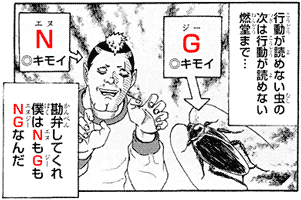
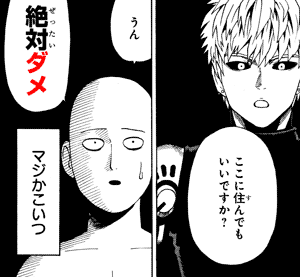
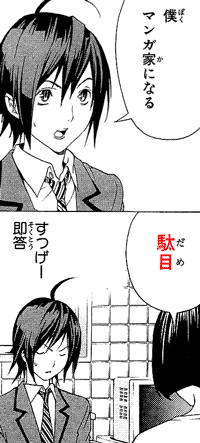
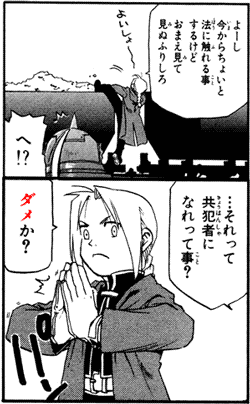
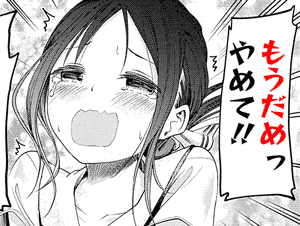
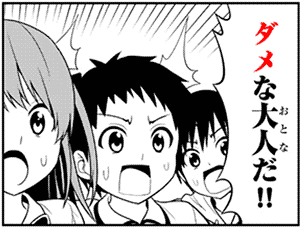
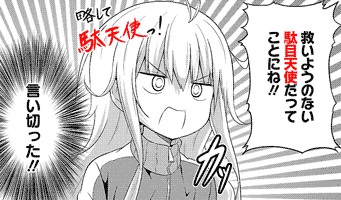
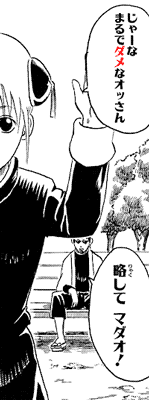
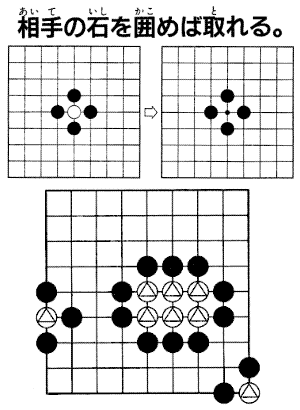
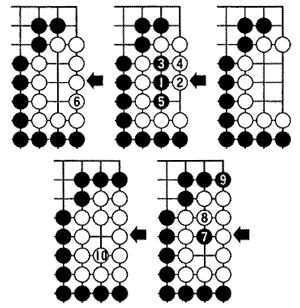
human bean? i wonder what those taste like
ReplyDeleteUseful. Might want to correct the 'bean' part though
ReplyDeleteDame ningen. Bad human bean. o ... k ... a .... y
ReplyDeleteHuman bean is a deliberate misspelling of human being. :) I've used it quite a lot in my life and never had confusion, so while it may be strange to some English speaking countries, in the UK at least it's well understood. Hope this helps!
ReplyDeleteIs "Damete" a japaness word?
ReplyDelete